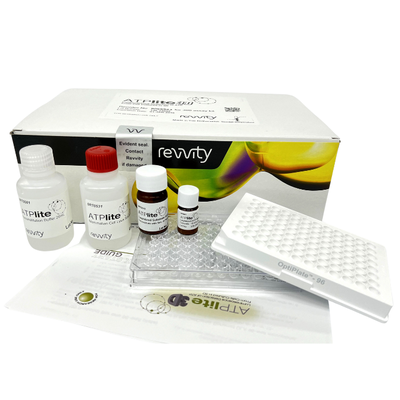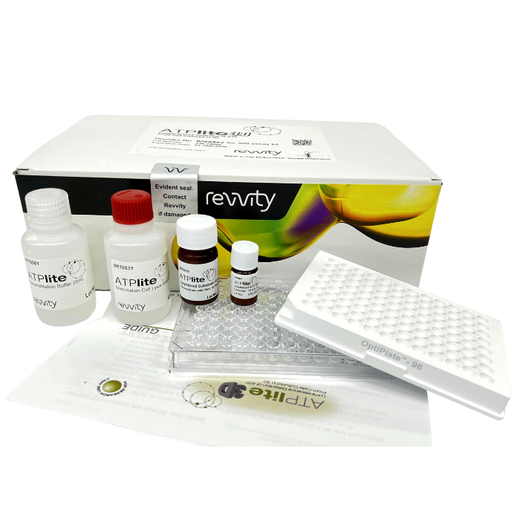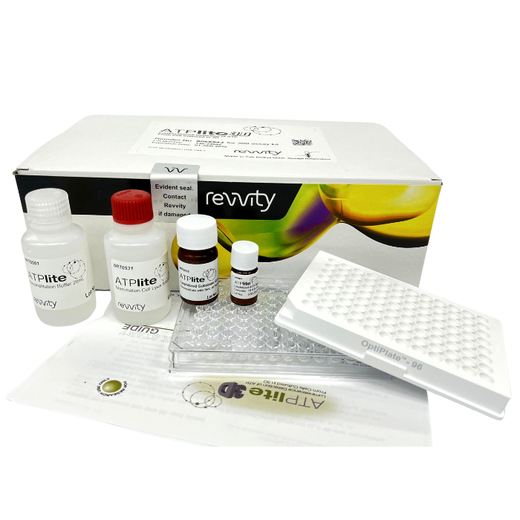
ATPlite 3D, 300 Assay Points

ATPlite 3D, 300 Assay Points




ATP-monitoring luminescence assay kit for quantitative evaluation of proliferation and cytotoxicity of mammalian cells cultured in 3D spheroids.
| Feature | Specification |
|---|---|
| Application | Cell Viability |
| Assay Points | 300 |
ATP-monitoring luminescence assay kit for quantitative evaluation of proliferation and cytotoxicity of mammalian cells cultured in 3D spheroids.


ATPlite 3D, 300 Assay Points


ATPlite 3D, 300 Assay Points


Product information
Overview
ATP is a marker for cell viability because it is present in all metabolically active cells. Because ATP concentration declines rapidly when cells undergo necrosis or apoptosis, monitoring ATP is a good indicator of cytocidal, cytostatic and proliferation effects. ATP assay is key to successfully detect cell viability. Our ATPlite 3D™ and ATPlite 1step 3D luminescence assay systems use patented innovative technologies that measure cell proliferation and cytotoxicity in 3D cultured mammalian cells based on the production of light caused by the reaction of ATP with added luciferase and D-luciferin.
ATPlite 3D is an Adenosine TriPhosphate (ATP) monitoring system based on firefly (Photinus pyralis) luciferase. This ATPlite luminescence assay is the alternative to colorimetric, fluorometric, high content microscopic analysis and radioisotopic assays for the quantitative evaluation of proliferation and cytotoxicity of mammalian cells cultured in 3D spheroids. ATP monitoring can be used to assess the cytocidal, cytostatic and proliferative effects of a wide range of drugs, biological response modifiers and biological compounds.
Advantages:
- Long-lived luminescent signal: half-life (t1/2) greater than 5 hours, depending on cell type and medium
- The separate lysis step, using sodium hydroxide for tissue lysis, is the best option for full spheroid lysis and extraction of ATP
- Rapid: results generated in 40 - 45 minutes
- Simple and reproducible: no separation steps; only two reagent additions and mixing. A final transfer step may be necessary, depending on the type of plate used for Spheroid growth
- Homogeneous assay: no cell harvesting or centrifugation required
- Wide linear dynamic range: detect ATP from spheroids made by seeding as few as 200 cells, and up to 5000 cells
- Convenient storage conditions (2 - 8 °C)
- No DTT: Unlike most luciferase detection reagents, lites products do not contain DTT, eliminating toxic hazards, unpleasant odors and the need for hood work
- Excellent Z' Values: All lites products offer robust, sensitive performance, with high signal-to-background ratios and excellent Z'values
Kit Components
- 3 vials of Lyophilized Substrate Solution
- 1 x 20 mL of Substrate Buffer Solution
- 1 x 20 mL of Mammalian Cell Lysis Solution (MCLS)
- 1 vial of Lyophilized ATP Standard Solution
- 1 x CellCarrier Spheroid ULA 96-well microplate (product # 6055330; 10 plates, 6055334; 40 plates)
- 1 x OptiPlate-96 (product# 60052900 for 50 plates; 6005299 for 200 plates)
- 4 x TopSeal-A (product # 6050185; 100 seals)
- 1 x Quick Start Guide
Storage: Buffer, MCLS and vials should be stored at 4°C. Microplates and TopSeal-A can be stored at Room Temperature.
Specifications
| Application |
Cell Viability
|
|---|---|
| Assay Points |
300
|
| Automation Compatible |
Yes
|
| Brand |
ATPlite 3D
|
| Detection Modality |
Luminescence
|
| Format |
Microplates
|
| Protocol |
2-step
|
| Signal Halflife |
At least 5 hours
|
| Shipping Conditions |
Shipped Ambient
|
| Unit Size |
300 assay points (96-well)
|
Resources
Are you looking for resources, click on the resource type to explore further.
AlphaLISA and LANCE (TR-FRET) biomarker assays can be used to measure ECM-associated protein modulation caused by human...
Discover the cutting-edge of luminescence assay technology, offering unparalleled sensitivity and dynamic range for applications...
In the process of developing new therapeutic molecules, toxicity – whether it is to be avoided or whether it is desired – is an...
Luciferase assays are essential for examining transcriptional gene expression, virus life cycles, and cell viability. These assays...


How can we help you?
We are here to answer your questions.






























